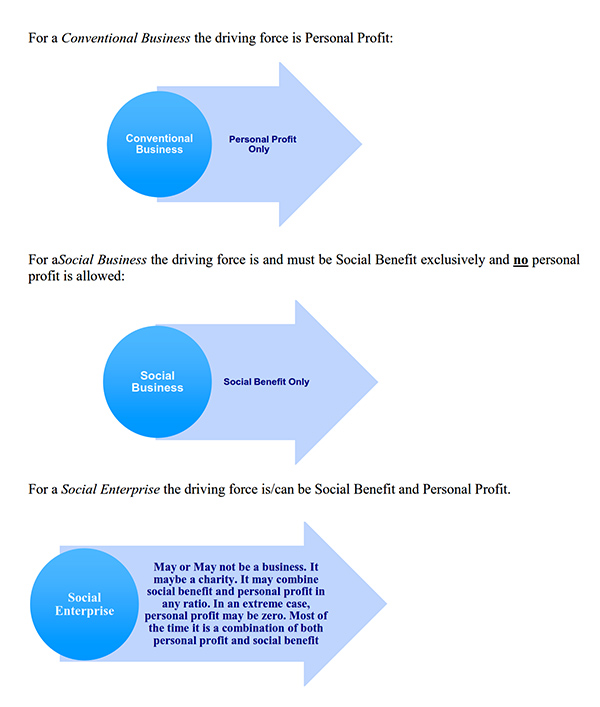The content is not available for Bangla language.
A Note on Social Business and Social Entrepreneurship
Muhammad Yunus
January 12, 2020
This is a short note to draw your attention to the difference between Social Business, Social Entrepreneurship, and Social Enterprises. In some writings I see the differences are blurred or even the terms are used interchangeably. It will be damaging to the concepts to use these terms interchangeably. I have tried to clarify this in my writings in the past. But I see that the confusion still persists.
I have defined social business as a business which is created solely for the purpose of solving a social or environmental problem, and it is a business from which owners don’t take any dividend except to recoup their own investment. The 7 principles of Social Business include:
- Business objective will be to overcome poverty, or one or more problems (such as education, health, technology access, and environment) which threaten people and society; not profit maximization.
- Financial and economic sustainability
- Investors get back their investment amount only. No dividend is given beyond investment money
- When investment amount is paid back, company profit stays with the company for expansion and improvement
- Gender sensitive and environmentally conscious
- Workforce gets market wage with better working conditions
- Do it with joy
Social entrepreneurship and social enterprises are much broader concepts. They relate to initiatives that solve some social or environmental problems. One relates to the entrepreneur, another relates to the enterprise. A Social enterprise may not be a business at all. It may be a non-business initiative of a person to help society overcome some problem. It ranges from non-business to businesses making attractive profit. A social enterprise may be a charity organization and/or it can be a profit-making businessproducing both personal profits and social benefits. However, in a rare case if a Social Enterprise produces no personal profit but only producessocial benefits such a social enterprise becomes the same as a Social Business, as long as it remains so. But, as a social enterprise it may move into earing personal profit without hesitation.
Social Business is a small subset of Social Entrepreneurship. In order to distinguish the two types of entrepreneurs we call an entrepreneur engaged in social business as a” social business entrepreneur”, rather than a “social entrepreneur”. The concept of social entrepreneurship is so broad that in the practical world it has very limited usefulness.

Should YSBC courses include discussion on social entrepreneurship?
Of course it should. All theoretical and practical initiatives to bring social dimension in economics should be included in YSBC courses on social businesses, so that students have a clear understanding of the differences amongst them. These courses would however go deeper into the discussion on the theory and the practices of social business because these courses specialize on this topic. Other concepts in this group of concepts should not be ignored. It is very important that students understand the whole range of concepts to understand the concept of social business better.
Let me present the following excerpt from chapter one of my book “Building Social Business” below:
“Please find an explanation of the difference between the two terms, such as, “social enterprise,” “social entrepreneurship.” Many other similar concepts are frequently used in literature devoted to efforts to address problems such as poverty. Although these terms are used in varying ways by different writers, they are generally used to refer to sub-concepts within either the profit-making world or the traditional world of non-profit organizations.
“Social entrepreneurship” relates to a person. It describes an initiative of social consequences created by an entrepreneur with a social vision. This initiative may be a non-economic initiative, a charity initiative, or a business initiative with or without personal profit. Some social entrepreneurs house their projects within the traditional non-governmental organisations (NGOs), while others are involved in for-profit activities.
“In contrast with social entrepreneurship, social business is a very specific type of business – a non-dividend company with a social objective. A social business may pursue goals similar to those sought by some social entrepreneurs, but the specific business structure of social business makes it distinctive and unique.”
We do understand that there are many varying definitions for the term Social Entrepreneurship, but please ensure that the term is not used interchangeably with Social Business.To avoid confusion, always highlight the differences between the two concepts: Social Business and Social Entrepreneurship. Please let us know if you have any questions or suggestions to avoid future confusion.
Related Contents
Grameen China Newsletter-August 2019
Professor Muhammad Yunus at Inclusive Finance Innovation lab, in collaboration with Grameen China an...
Unequal vaccine access will return to haunt the rich
Both morality and self-interest, then, dictate that vaccines — as well as diagnostics and ther...
Yunus Centre Interns Magazine#12
YC Intern Magazine basically gives you the idea about the internship program. This magazine tells th...
YYSA Social Business in Yamagata, Japan
When Solasido Honbou turned 39 years in 2020, he made a very unusual decision. As a Yoshimoto Comedi...
Professor Muhammad Yunus join hands with Yoshimoto Kogyo a leading entertainment company in Japan to form yunus-yoshimoto Social Action (yySA)
In April 2011 Yoshimoto Kogyo, a leading entertainment company in Japan, initiated the “Living...
Grameen Healthcare Services Ltd. Newsletter February 2023
For more information please visit : https://www.grameenhealthcareservices.org/...
